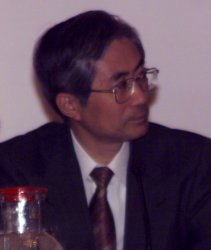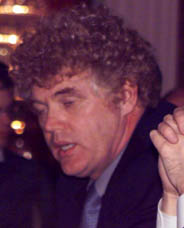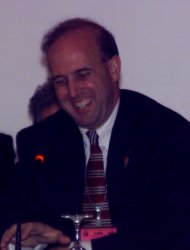| |
Consultation
on the draft World Energy Assessment Report
The Energy and Atmosphere
Programme of the United Nation's Development Programme convened a consultation
session on the draft World Energy Assessment prepared by the UNDP, the
UN Department of Economic and Social Affairs and the World Energy Council.
The Report and on
going consultation process will be one of the key inputs into the formal
preparatory process leading up to the ninth session of the UN Commission
on Sustainable Development in 2001 when energy will be a special theme.
The 19th Special Session of the UN General Assembly in 1997 set out the
multi-year programme on energy which will also address key linkages with
atmospheric and transport issues.
The second draft
World Energy Assessment (WEA) is designed to provide information and analytical
background to policy makers and others so that they can better understand
energy's critical relationship to sustainable development, and how energy
can serve as an instrument of that goal.
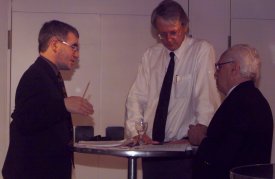 In our RealAudio presentation, Jose Goldemberg, Chair of the World Energy
Assessment (second speaker) and Thomas B. Johansson, UNDP, Director, Energy
and Atmosphere Programme (first speaker) talk to Peter Doran about the
background to their work and some of the draft conclusions.
In our RealAudio presentation, Jose Goldemberg, Chair of the World Energy
Assessment (second speaker) and Thomas B. Johansson, UNDP, Director, Energy
and Atmosphere Programme (first speaker) talk to Peter Doran about the
background to their work and some of the draft conclusions.
Input to the WEA
Consultation:
Comments on the draft Assessment from all stakeholders can be submitted
to the UNDP up to 10 January 2000. If possible these contributions should
be made by 20 November 1999. Inputs can be made electronically and submitted
directly to the UNDP via e-mail (caitlin.sanchez@undp.org)
or via the World Wide Web (http://www.undp.org/seed/eap/activities).
Contributions can also be sent to Caitlin Allen-Sanchez, Energy and Atmosphere
Programme, UNDP FF-Building, 9th Floor, 304E 45 St., New York, N.Y. 10017,
USA.
Draft Report Outline:
- Part one considers
the linkages between the present energy system and major global challenges,
namely, economic development, social issues, the environment and security.
- Part two examines
resource availability and reserves of fossil fuels, fissile materials,
and renewables and considers whether they can supply enough energy to
meet the world's needs through next century and beyond.
- Part three reviews
technological options for sustainable energy.
- Part four synthesizes
and integrates the material presented in the earlier chapters by considering
the question: Do sustainable energy futures exist?
- The final part
analyses policy considerations and options that could shift the present,
unsustainable course to a sustainable direction.
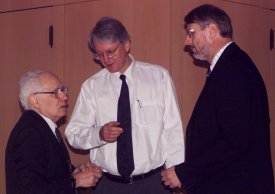 |
Left to right:
Jose Goldemberg, WEA Chairman, Thomas B Johansson, Energy and Atmosphere
Programme, UNDP, and Hans-Holger Rogner, Energy Resources, Germany
|
| Kei-nang
Mak, Energy and Transport Unit, DESA |
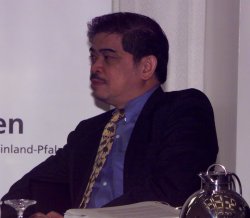 |
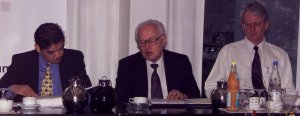 |
Left to right:
Mak, Goldemberg and Johansson
|
| Goldemberg
outlines the draft WEA report |
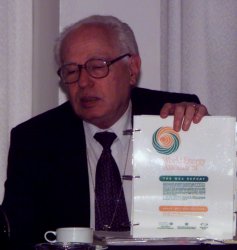 |
Adaptation
Responses to Climate Change
This event was sponsored
by the Potsdam Institute for Climate Impact Research and the Climate Action
Network South Asia. In his keynote presentation on the Science of Adaptation,
Barry Smit, University of Guelph, Canada, explained what adaptation is
and what is known about it. He also discussed the needs and opportunities
for adaptation in the future. He noted that: adaptive capacity varies
regionally; development decisions can fail to look at the risks associated
with climate change; it is necessary to build capacity; and there is increasing
knowledge regarding adaptive capacity. He said adaptation was an essential
part of the climate change agenda and asked negotiators to identify their
needs regarding information about adaptation.
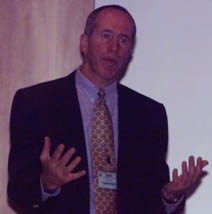 |
Barry Smit,
University of Guelph |
| Wolfram
Klein, German delegation |
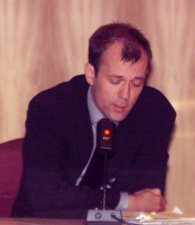 |
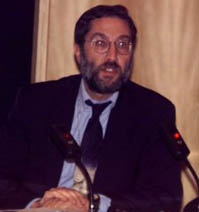 |
Alan Miller,
GEF |
|
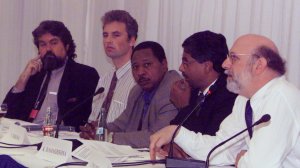 Getting
to Work: Finance, Capacity Building and the CDM - presented
by the NGO Consortium for a North-South Dialogue on Climate Change
and the Foundation for Business and Sustainable Development Getting
to Work: Finance, Capacity Building and the CDM - presented
by the NGO Consortium for a North-South Dialogue on Climate Change
and the Foundation for Business and Sustainable Development
This
seminar was convened by BCAS, the Pacific Institute, WHRC, ENDA
and COPPE to provoke a discussion on the enabling conditions that
will encourage investment in CDM projects and promote the kinds
of capacity building needed to advance the agenda of sustainability
and to allow CDM projects to be successfully replicated. From
left to right: Thomas Black Arbalez, Colombia, Robert Kleiburg,
Shell International, Youba Sokona, ENDA, Kilaparti Ramakrishna,
The Woods Hole Research Center, and John Palmisano, ENRON
Kilaparti
Ramakrishna, Woods Hole Research Center, and Youba Sokona, ENDA,
welcomed participants. The speakers on 'Creating the Conditions
that Encourage Investment' were: Thomas Black Arbalez, Colombia,
John Palmisano, Enron, and Robert Kleiburg, Shell International.
The
speakers on 'Capacity Building and Sustainability in the CDM context'
were: Ogunlade Davidson, Co-Chair of the IPCC Working Group lll,
Luis Pinguelli Rosa, COPPE, Federal University of Rio de Janeiro,
and Christinia Figueres, Center for Sustainable Development in the
Americas.
Lee
Solsbery, Foundation for Business and Sustainable Development, and
Atiq Rahman, Bangladesh Center for Advanced Studies, closed the
event.
|
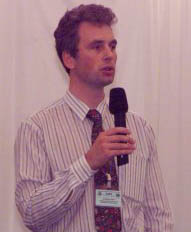 |
 Robert Kleiburg, Climate Change Analyst for Shell International
- London, comments on the importance of industry and private-sector
participation in CDM development processes
Robert Kleiburg, Climate Change Analyst for Shell International
- London, comments on the importance of industry and private-sector
participation in CDM development processes
|
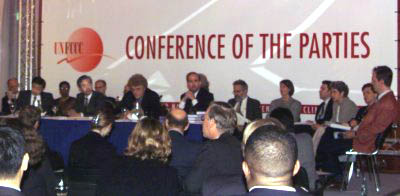 IGES
book launch and seminar on Japan's responses to climate change IGES
book launch and seminar on Japan's responses to climate change
Japan's Institute
for Global Environmental Strategies (IGES) hosted this seminar to mark
the launch of a book entitled, "The UN Framework Convention on Climate
Change Activities Implemented Jointly Pilot: Experiences and Lessons Learned."
The event was hosted by the book's editor, Robert Dixon, Deputy Assistant
Secretary at the United States Department of Energy, and addressed by
H.Hamanaka, Environment Agency, Japan.
The Master of Ceremonies
was the Secretary-General of IGES, Masaru Moriya. Many of the 34 contributing
authors who were present were honored and thanked for their work by the
book's editor who met many of them for the first time at the evening seminar.
Much of the preparation work was conducted in 'cyberspace' according to
Mr.Dixon.
One of the book's
contributors and referees, P.Hassing from the Ministry of Foreign Affairs
in the Netherlands, recalled some of the lessons he has learned from the
AIJ pilot phase. He said the pilot phase had led, perhaps most of all,
to capacity building within the Netherlands, the lead time for the transition
to bankable projects had produced lessons of its own, the pilot phase
had generated a positive attitude for future work, and the experience
left him with a better understanding of the equity issue in developing
countries.
The evening concluded
with a seminar on progress in Japan in the field of climate change issues,
moderated by Masaru Moriya, Secretary-General of IGES. Kazuhito Takemoto,
Environment Agency, Japan, made a presentation on new law concerning the
promotion of measures to cope with global warming. Masayuki Sasanouchi,
Project Manager, Environmental Affairs Division, Toyota, described the
automotive industry's action in response to the Kyoto Protocol.
Useful contact details:
Institute for Global Environmental Strategies: http://www.iges.or.jp/
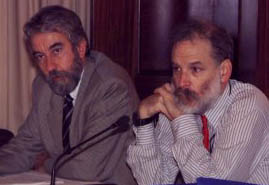
The
IEA energy indicators effort: extension to carbon emissions as a
tool of the COP
This event
highlighted the IEA's effort on energy and carbon emissions indicators
as tools for the COP. Lee Schipper, IEA, made a presentation outlining
the motivation, methodology and applications of the IEA approach.
He said energy indicators are widely used in the IEA, and that domestic
applications are changing. Their international application in the
context of climate change is new. Left to right: Olivier Appert
(e-mail: olivier.appert@iea.org)
and Lee Schipper, International Energy Agency
|
World
Bank's National Strategy Studies
Useful link: FBSD
On-line CDM dialogue: http://www.foundation.no/cdm_dialogue
This web site's content is based on actual private sector CDM projects
and activities. Visitors can review and critique projects and methodologies
and engage in "threaded" discussions. 4Vwbblack Thomas Black Arbalez,
Colombia 4Vwbpart 4Vwbparts2 Government representatives participating
in the NSS meeting
Miscellaneous:
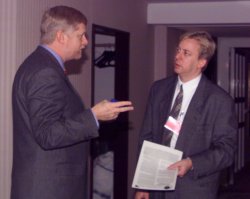 |
Kimo
Goree, Managing Editor, ENB, speaks with G. Sleeuwagen, Foreign Affairs,
Belgium |
| Delegates
take a coffee break in the lounge area of the Maritim Hotel |
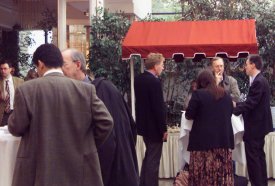 |
 To listen to IISD's RealAudio coverage of the COP-5
deliberations and side-events you will need the RealAudio Player. Download
the free Real Audio player by clicking on this button.
To listen to IISD's RealAudio coverage of the COP-5
deliberations and side-events you will need the RealAudio Player. Download
the free Real Audio player by clicking on this button.

|

 Thursday,
28 October
Thursday,
28 October 












